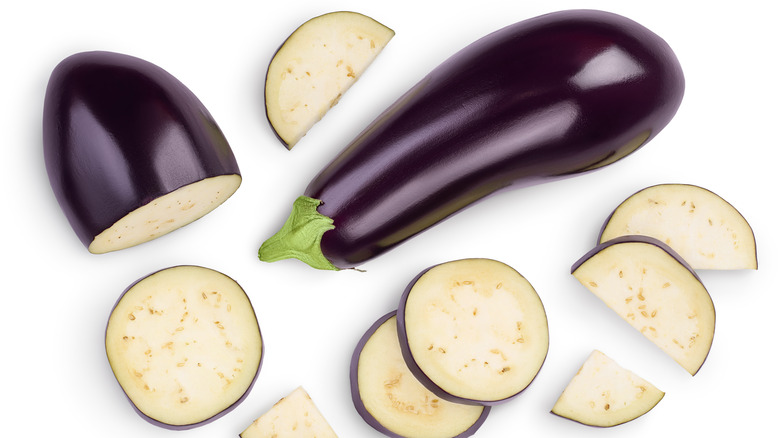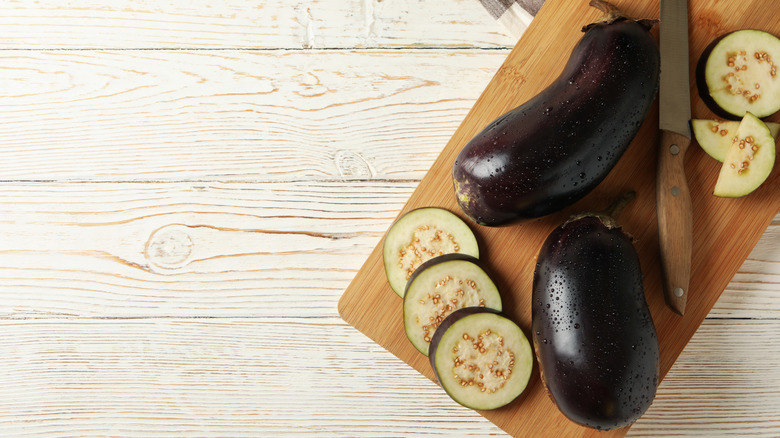Everything You Need To Know About Eggplant
The eggplant, or aubergine, is a unique fruit (yes, eggplant is a fruit) that has a flavor profile suitable for just about anyone's palate. A main ingredient that vegetarians and meat eaters alike enjoy due to its limitless possibilities of preparation, eggplant is (in our humble opinion) one of the most underrated healthy foods out there.
In India, where the fruit originates, eggplants grow wild and have been cooked for over 1500 years (via The Journal). surprisingly, it wasn't until the early 1800s, after being traded throughout Africa and Europe, that eggplant made its way to the Americas. This unique, star-shaped flower that brings us eggplant is self-pollinating, and, luckily for eggplant fans, they don't need a lot of sunlight to bloom, making them fairly easy to grow. If you are getting the idea to plant your own, this is your sign to go for it!
However, there is a lot more to be said about this deeply purple non-vegetable.
What exactly is an eggplant?
While many refer to eggplant as a vegetable, it is good to know the facts. As stated above, eggplant is, indeed, a fruit. If you are wondering why, it's because eggplant "[grows] from a flowering plant and [contains] seeds," according to Healthline. It belongs to the nightshade family of plants, which also includes tomatoes, okra, and zucchini.
Eggplant is usually treated as a vegetable, which makes it a perfect main course for all types of diets, from vegan to (almost) carnivore. Eggplants meatier texture offers itself well to filling dishes like eggplant parm or caponata – yum!
You should know that more varieties of eggplant exist than just your basic purple, oval shaped one. There are over eight different kinds of eggplant to choose from, according to The Kitchen. Taking a trip to your local farmer's market when eggplants are in season is sure to open your eyes to the wide variety. You'll, of course, find the most common one (Italian eggplant); as well as possibly the stripped graffiti (or Sicilian) eggplant, long Japanese and Chinese eggplants, the adorably tiny (and aptly named) fairytale eggplant, the white eggplant (which looks like a bleached version of the Italian variety), the micro Indian (or baby) eggplant, the little green eggplant (that name says it all), or the elusive Thai eggplant.
Eggplant can be cooked a variety of ways
The ridiculous amount of ways to cook eggplant only further its true greatness. Unlike some fruits and vegetables, you do not have to peel an eggplant in order to eat it. The skin is packed with nutrients that can be left on when braising or pan frying (via AllRecipes).
Eggplant soaks up oil like a sponge, causing it to fry pretty easily. Just be careful not to over oil it, and try lightly brushing olive oil onto each slice. If you are pan frying, it's best to oil one side and then place it (oil side down) in a hot skillet. Once you're ready to flip, lightly oil the top so the oil doesn't seep through. If you are going to bread your eggplant before frying, Delish recommends using a very thin layer of oil (about ¼ deep) for a crispy crust and soft inside.
The versatility continues! Eggplant can also be roasted in an oven or grilled up to perfection, whole or in slices. Those immaculate grill marks can be found on eggplant just as easily as on steak.
Most recipes suggest slightly salting each side of sliced eggplant before cooking to help tame any bitterness and frim up the flesh, but it's okay to skip if you're watching your sodium intake.
Eggplant has a high nutritional value
Healthline says that one cup of eggplant only contains 20 calories, allowing it to fit into almost any diet and making eggplant a great ingredient for heavier dishes. Additionally, eggplant is low in carbohydrates and contains three grams of protein.
Eggplant also has a high level of antioxidants that help the body fight off free radicals, which refer to toxic and beneficial compounds that are both good and bad for your body (via International Journal of Biomedical Science). Having such a high level of antioxidants per cup also makes eggplant great for reducing the risk of heart disease, and who doesn't want that?
Being used as a meat replacement quite often, eggplant can help with weight loss, notes Healthline. While eggplant may not taste exactly like chicken or steak, a good substitute is always worth considering.



